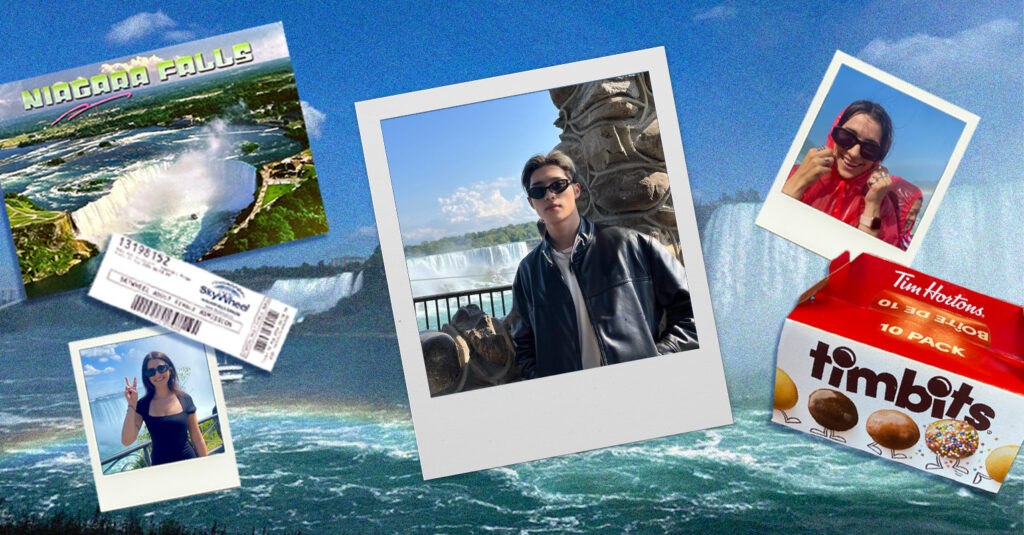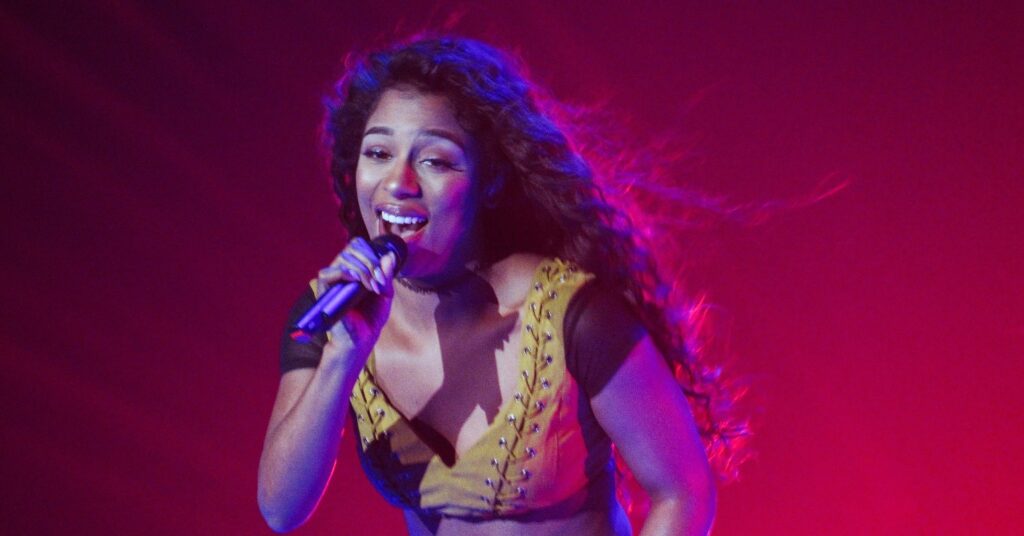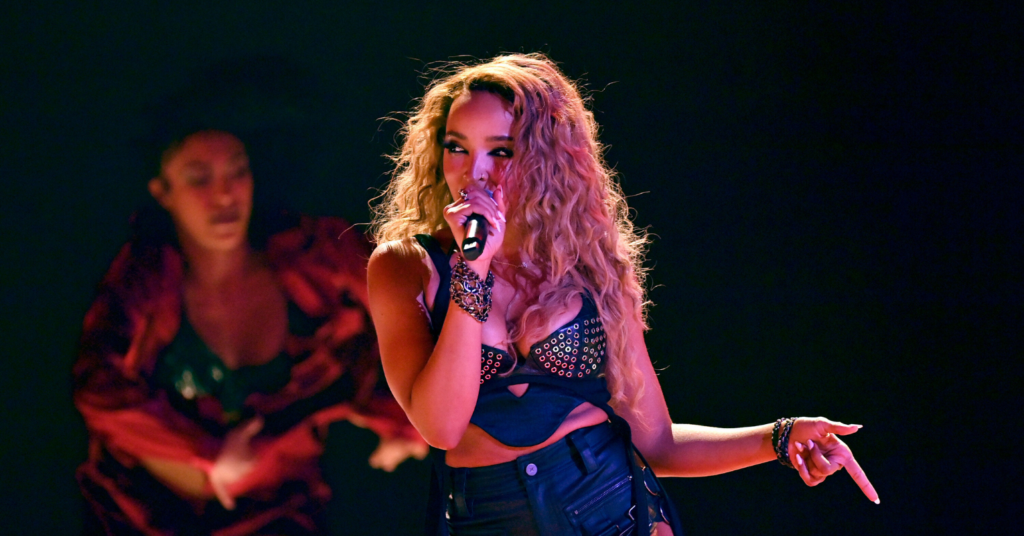Prior to the release of her fourth studio album, Please Don’t Cry, Marlanna Evans, better known as Rapsody, held a special event in Los Angeles on April 25 titled “The Duality of Rapsody – Navigating the Artist and The Individual.” Moderated by entertainment journalist and content creator Gia Peppers, the intimate event featured stories about Rapsody’s journey in music and life, snippets from her latest album, and a Q&A segment. EnVi had the opportunity to attend and get a deeper look into Rapsody’s world and artistry straight from Rapsody herself.

Starting her career in college, the North Carolina native has worked with the likes of Kendrick Lamar, H.E.R., and J. Cole. Often citing Erykah Badu and Lauryn Hill as musical inspirations, Rapsody has created a lane and sound of her own. Praised by her colleagues as a force among not only women in hip-hop but hip-hop in general, she has showcased a deep passion for the art of rap.
Rapsody pushes the boundaries in her latest project. Released on May 17, Please Don’t Cry features 21 tracks with “Asteroids” as the lead single, a collaboration with producer and rapper Hit-Boy. Make no mistake: Rapsody’s rap expressions and drum beats make this a top notch hip-hop album. But, the heavy inclusion of soulful melodies and vocals of R&B showcase how the two genres can be married together in a similar vein as The Miseducation of Lauryn Hill. With multiple features from artists both within and outside of hip-hop, Rapsody infuses different genres into the album and offers a deeper insight into her life.
The Healing Journey
“I feel at peace. This is what freedom feels like,” said Rapsody when talking about her latest album, released almost five years after her last studio album. The culmination of a personal journey of healing and self-reflection, the poignantly titled Please Don’t Cry allows listeners to connect with Rapsody on a deeper, more personal level than in previous albums. During the event, she went on to explain that the first part of her process making this album was to purge her emotions by being a crybaby. Rapsody also unplugged herself from social media and even family. This allowed her to “sit in [her] own fire” and do a lot of praying. She shared that growing up, it wasn’t common to show emotions. Due to this, she needed to take time to overcome the challenge of getting comfortable with herself. Though a difficult process for anyone, Rapsody overcame this challenge and explored her emotions through music.
Getting Raw in Please Don’t Cry
Determined to be as human as possible on her newest project, Rapsody told her producers that she wanted to be “naked in this album.” This is visually displayed through the album artwork, which showcases Rapsody veiled with a teardrop. The veil signifies her ability to see clearly, and the tear represents the need to cry and feel human.
Along with the production and album art, Rapsody’s lyrics are also raw and profound. While her first three albums focused on her skills as a rapper and leaning on others, in Please Don’t Cry, she becomes more intentional to create an album that’s “all me.” While this was a long and uncomfortable process for her, she succeeded in creating that raw, human connection with her listeners. From relationships to insecurities and joy, Rapsody captures these relatable emotions and life lessons without being “preachy about it.” Instead, the production, her vulnerability, and her storytelling in each song captures the attention of listeners.
While big names such as Erykah Badu, Lil Wayne, and Baby Tate featured on the album, they only act as support. Rapsody makes it clear that this is her work and her story. Rather than just an album, this is Rapsody’s diary of her hard work and journey over the past five years. Through this new work, Rapsody accomplishes her goal of forming a human connection with her audience.
See below for EnVi’s Top 5 songs from the album:
Asteroids
With an old school flow and nostalgic, arcade-like beat, this is a song listeners won’t be able to help but groove to. Throughout the track, Rapsody name drops many prominent Black artists like Patti Labelle, Iman, and Nas, using them as references for how she views herself. Ultimately, Rapsody highlights some of their best qualities and hers as well while reflecting on her career as a hip-hop artist thus far. However, the track’s standout message is how seriously she takes rap as an art instead of a trend.
Look What You’ve Done
With a changeup in delivery that’s reminiscent of Lauryn Hill and a bit of Lisa “Left Eye” Lopes, the album’s fourth track is where Rapsody starts to infuse more R&B. Giving a nod to her idol, Rapsody references Hill by name, asking why she disappeared and how Rapsody will do the exact same thing. While there are some light vocals in the background, the song would benefit from verses by a vocalist. The first artist who comes to mind for this potential remix is Alt R&B princess SZA. Given SZA’s emotional vocals and her exploration with rap on “Smoking on my Ex Pack,” she would fit in perfectly with this song. Both Rapsody and SZA are also great storytellers and know how to move listeners — not only with their vocals but also with their personal, conversational approach to their deliveries. Hey, Rapsody and SZA, please make this happen!
Black Popstar (feat. DIXSON)
With its uptempo beat and sounds from city streets, “Black Popstar” encourages listeners to get up and dance, especially on a sunny summer day. Although more about self-reflection and less about dissing, this track is in a similar vein to that of Kendrick Lamar’s smash hit “They Not Like Us.”
Back In My Bag
Using a sample of Ebo Taylor’s “Love and Death,” this is the track where Rapsody’s rapping is the most aggressive. She starts the song with the lyrics, “Sometimes you gotta lose yourself to find yourself again. Welcome back, Marlana,” signifying her return from an emotional journey of healing. There’s also a seamless beat switch that personifies this idea sonically. As the 15th track, it’s well-placed in the album. Although all of her songs focus on this period in her life, the first half of the album reflects on the more vulnerable part of her journey. “Back In My Bag” shares what Rapsody has learned from this journey and marks her return from this period to set a different tone for the remainder of the album.
A Ballad For Homegirls (feat. Baby Tate)
The combination of Baby Tate’s sweet vocals and rapping, Rapsody’s storytelling, and a soulful, sensual beat makes this the perfect song to listen to while having conflicting feelings about a former lover. Acting as a warning song for women, “A Ballad For Homegirls” advises them not to get back with their ungrateful ex-partner, even if they have second guesses. The back-and-forth and layering of Baby Tate and Rapsody’s vocals makes the song sound like a heartfelt conversation between friends who are giving each other advice and support.
Keep up with Rapsody and her music on Instagram, YouTube, and TikTok. Please Don’t Cry is now available on all streaming platforms.
Want to read more about the latest music news? Check out the Formation team’s recap of Megan The Stallion’s concert here.




